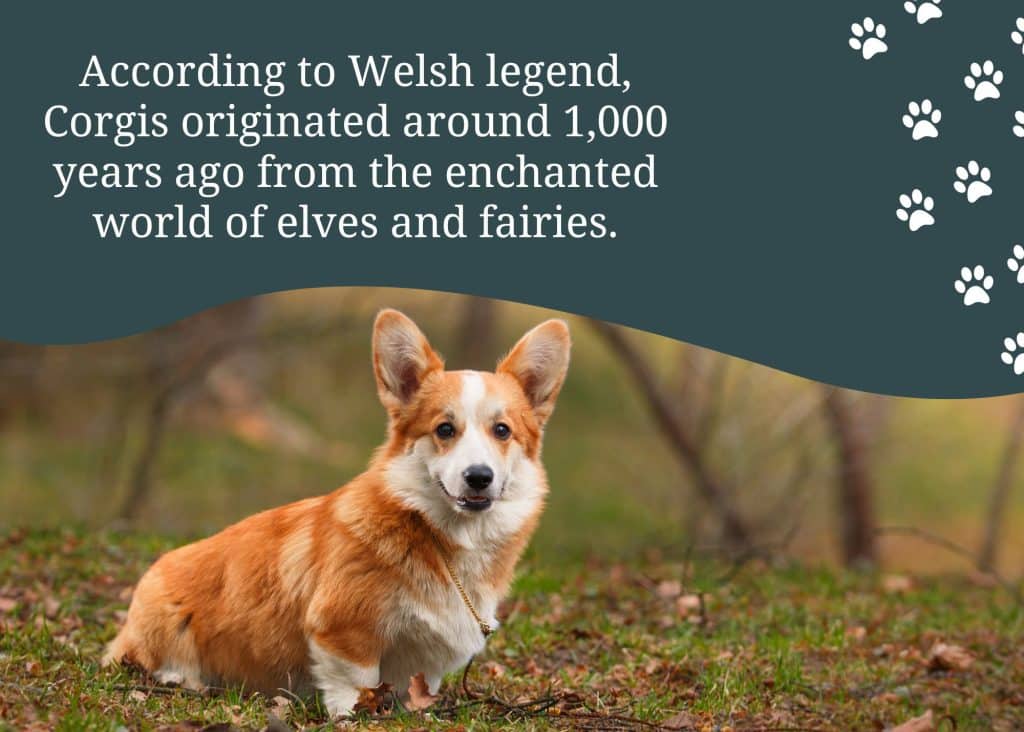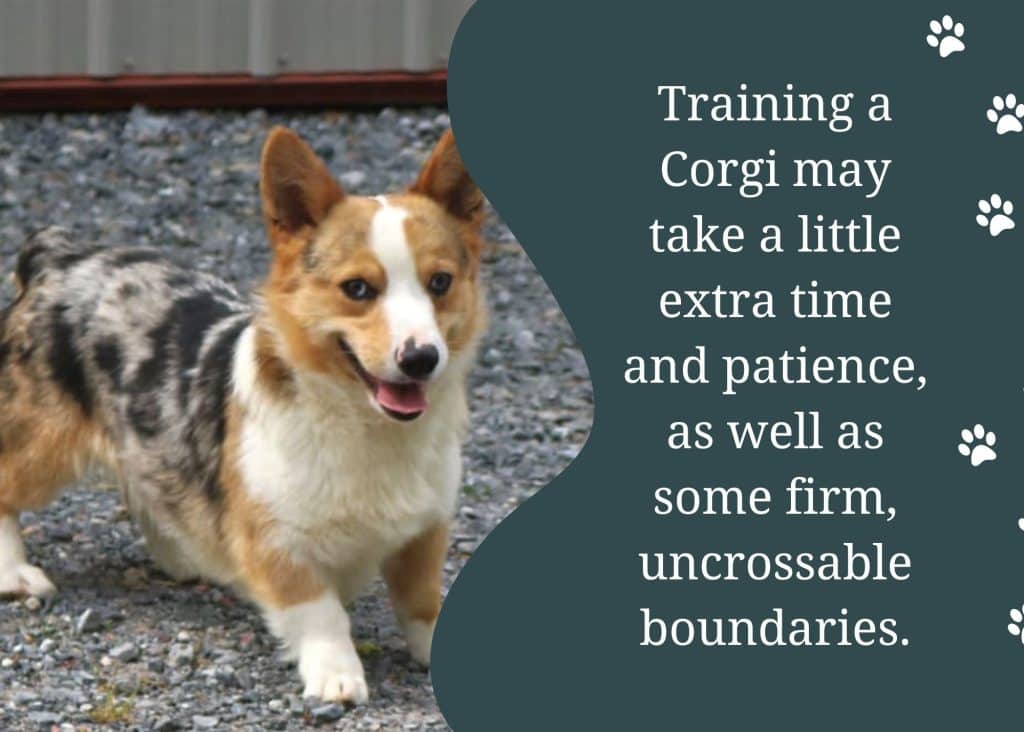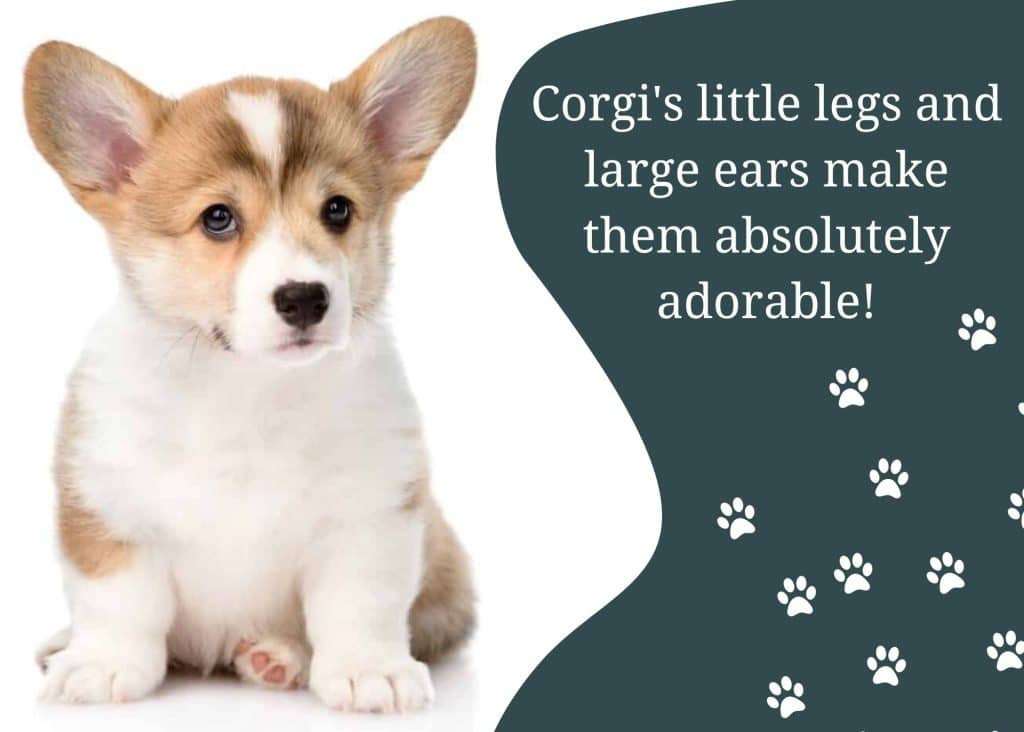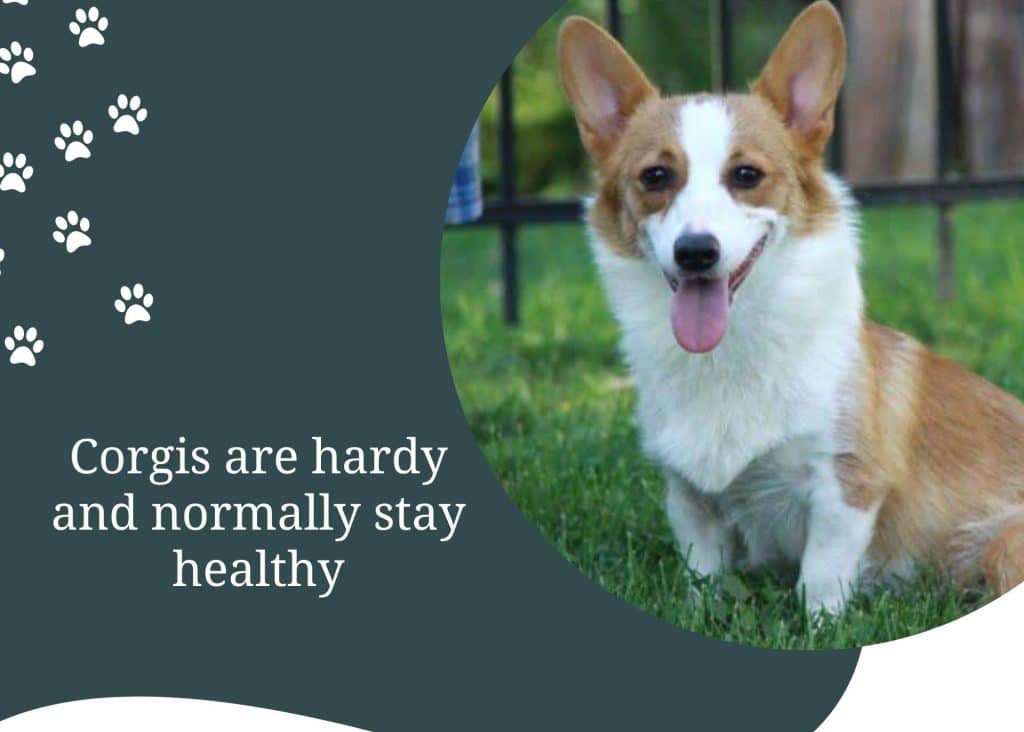Found grinning on water bottles and socks everywhere, it’s one of the best-known and loved dog breeds:
It’s hard to resist these short little critters' pert attitude and a permanent grin. Even their stubborn streak and mischievous side can seem cute!
Today, Infinity Pups would like to tell you about all the ups and downs of owning one of these sassy pups.
Ready to learn all about Corgis?
Let’s get started!
Table of Contents
Corgi Basic Facts
For starters, here are a few general facts about Corgis:
- There are two kinds of Corgis–Pembroke Welsh Corgis and Cardigan Welsh Corgis. There are slight differences between the two types, but they are very similar. The quickest way to tell them apart is to look at their tails: Cardigans have tails, while Pembrokes’ tails are docked.
- Corgis were bred to herd cattle and still love to herd things. They might try to herd people or animals with tiny nips and barks.
- They are small but have spunk that far outweighs their size! Corgis are a feisty, scrappy, energetic breed. They won’t hesitate to take on an opponent twice their size.
- Corgis are the smallest breed in the AKC’s herding group.
- Corgis tend to be vocal and may bark at everything they see.
- While quite intelligent, Corgis are known to have a stubborn streak. They may require some extra time and patience when it comes to training.
- This delightful breed is known for its permanent ear-to-ear grin. It’s hard to find a Corgi looking down or depressed!
Now, on to Corgi history.
Corgi History
According to Welsh legend, Corgis came from the enchanted realms of the elves and fairies. They were eventually found by a couple of children who took them home, and–voila!--Corgis had joined the ranks of humans.
But for those who don’t care for myth, Corgis originated in Wales some 1,000 years ago.

They were used as all-around farm/herd dogs. Their low build made them perfect for herding cattle, as they could easily avoid flying hooves.
Historians say Corgis were brought to England in 1107 by a group of weavers invited to work for Henry I. When they came to England, they brought their herding dogs along with them, and the breed stuck.
Corgis eventually found their way to America, and today they are a popular family pet. They are also known for being a favorite of Queen Elizabeth II of England, who owned over 30 Corgis over her lifetime. The Queen even had a “Corgi Room” devoted to her dogs in Buckingham Palace!
Corgi Temperament
If you have ever owned a Corgi, you’ll know how delightful and happy they are. But you’ve also seen a bit about their shortcomings.
Here is a list of traits Corgis are known for:
-
Positivity
Corgis are rarely seen without that big, happy grin and are permanently excited about life. Their bright, cheerful personality can be a massive mood booster if you are having a bad day!
-
Herding
Though they aren’t usually working dogs these days, Corgis still have herding instincts. You may see them exhibit herding behaviors such as small nips and barks, and they like everyone to stay in a group. If one person gets up and leaves, they may run after them and try to herd them back to the group.
It’s not acceptable to herd humans. You may have to teach your Corgi the rules about what they can and cannot herd.
-
Independence
Corgis like to be involved in everything and like it even better if they are in charge. They like human interaction but don’t expect them to come at every beck and call. They may have their ideas about things and won’t always want to obey you.
Training a Corgi may take a little extra time, patience, and some firm, uncrossable boundaries.

-
Watchfulness
From a scrap of food that falls from the table to a stranger on the other side of the street, your Corgi isn't going to miss a thing. Don't try to play tricks on him–chances are it won't work!
Their total alertness can make them excellent watchdogs. They also have a "big dog" bark that's hard to ignore!
-
Energy
Don't let the small size fool you. Corgis are herding dogs, and they need plenty of exercise. They will love an ample, open space to run around and burn off extra energy.
Corgis thrive on physical activity and love to hike, go to the park, or learn dog sports such as agility.
-
Spunk
Corgis might look cute and funny, prancing around on those short little legs with their big silly grins. But they have enough spirit to take on a foe three times their size, and they will, too!
These guys were bred to herd cattle. They won't flinch at a strange person or neighbor dog–chances are they will rise to the challenge. They can be pretty fierce.
Don't worry, though. Corgis tend to be spunky and happy, not aggressive and protective. They won't cringe at an enemy, but they like everyone and are friendly with strangers.
Owning A Corgi
Owning one of these happy, spunky dogs can be such fun! Here is what you can expect if you decide to take one home.
Appearance
One of the cutest things about Corgis is their short little legs. Corgis only stand about a foot at the shoulder, and their legs are only a few inches long. They look so cute and funny, tripping around on their tiny legs! And it is always amusing when they streak across the yard as fast as they can, with all their legs stretched out!

Another cute feature they have is their foxlike faces with big, expressive ears. There is nothing cuter than when a Corgi looks up at you, all pert and sassy, with his big ears on high alert and his tongue hanging out of his broad grin!
Corgis come in a wide range of colors. They could be red and white, blue merle, tri-color, black, or fawn. They usually have white markings on their chest, feet, and head.
Another thing to note is that Pembroke Corgis do not have tails, while Cardigan Corgis do have tails.
Grooming
Corgis have thick, medium-long double coats that shed continuously, with heavier shedding occurring twice a year.
Grooming your Corgi is not hard, but you must keep on top of the shedding if you don't want hair all over the place. They only need baths if they get dirty, but regular baths may help you control the shedding.
If you have an exceptionally fluffy Corgi, you may need to trim him a little around the feet and face, but this is uncommon.
The rest is self-explanatory: trim his nails regularly, brush his teeth, and give him plenty of love and attention!
Training
As we said, Corgis are pretty independent and have a bit of a stubborn streak.
Because of their take-charge attitude and independence, training them may take some extra effort. You will have to make sure they know you are in charge because it's hard to change their minds if they decide they are the leader.
That said, Corgis are intelligent and love people-time, so if you are willing to put in the effort, you should be able to teach your Corgi whatever he needs to learn.
Health
Corgis are hardy and usually stay healthy.

But of course, there are things you should watch out for.
Some of these include:
One of the best ways to get a healthy puppy is to buy from a reputable puppy breeder. A good breeder will be open and honest with you about problems and take responsible care of their puppies.
Children and other pets
Corgis usually seem to love kids and get along with them well. However, that doesn’t mean you should leave a young child with a Corgi unsupervised. Even the nicest Corgi could get snappish if he gets his eyes poked, or his tail pulled.
Corgis usually do pretty well with other pets if properly introduced and socialized.
If you plan on bringing a Corgi puppy home soon, you’ll want to ensure you are prepared. Here are a few articles that might help get you up to speed and prepare you to be the best puppy parents:
- HOW TO SPOT AND AVOID A PUPPY SALE SCAM (PLUS WHAT TO DO IF YOU ARE CONNED!)
- 11 THINGS TO DO WHEN YOU BRING HOME A PUPPY (SO THEY’LL BE HEALTHY & WELL-TRAINED)
- 22 EASY STEPS TO PREPARE FOR A PUPPY (THAT ACTUALLY HELP)
We have other resources as well, such as our articles on puppy breeding and selling:
How To Start A Successful Puppy Business: Tips From Experienced Breeders • Infinity Pups
A Beginners Guide To Selling Puppies Online: Everything You Need To Know
Conclusion
Though they certainly have their shortcomings, Corgis are some of the most part, cheerful, beautiful dogs around! They can make a positive addition to any family.
If you want to bring one home, look at the Corgis for sale on our website at Infinity Pups.
If you think a Corgi isn’t for you and you want to check out other options, look at our selection of different breeds.
We have more information on some of our other breeds, including:
- Everything You Need To Know About Mini Australian Shepherds
- Your Guide To The Bernedoodle Puppy
- Is A Mini Aussiedoodle Puppy Right For You
- Golden Retrievers: Everything You Need To Know
We hope you find the perfect puppy for your family!
Until then, happy hunting.







